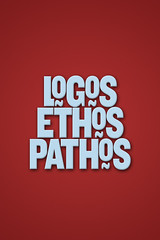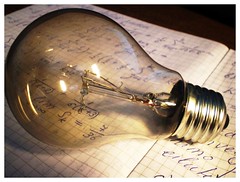These terms are the AP English Language and Composition Terms
| 214156447 | ad hominem argument | From the Latin meaning "to or against the man," this is an argument that appeals to emotion rather than reason, to feeling rather than intellect. |  | 0 |
| 214156448 | Allegory | The device of using character and/or story elements symbolically to represent an abstraction in addition to the literal meaning. |  | 1 |
| 214156449 | Alliteration | The repetition of sounds, especially initial consonent sounds in two or more neighboring words (as in "She sells sea shells"). | 2 | |
| 214187384 | allusion | a direct or indirect reference to something that is presumably commonly known, such as an event, book, myth, place, or work of art. They can be historical, literary, religious, or mythical. |  | 3 |
| 214187385 | ambiguity | multiple meanings, either intentional or unintentional, or a word, phrase, sentence, or passage |  | 4 |
| 214187386 | analogy | a similarity or comparison between two different things or the relationship between them. An analogy can explain something unfamiliar by associating it with, or pointing out its similarity to, something more familiar. |  | 5 |
| 214187387 | antecedent | The word, phrase, or clause referred to by a pronoun. |  | 6 |
| 214187388 | antithesis | the juxtaposition of contrasting words or ideas to give a feeling of balance |  | 7 |
| 214187389 | aphorism | A terse statement of known authorship that expresses a general truth or moral principle |  | 8 |
| 214187390 | apostrophe | a figure of speech that directly addresses an absent or imaginary person or personified abstration, such as liberty or love. |  | 9 |
| 214187391 | atmosphere | the emotional mood created by the entirety of a literary work, established partly by the setting and partly by the author's choice of objects that are desired. |  | 10 |
| 214187392 | caricature | a representation, espically pictoral or literary, in which the subject's distinctive feature or peculiarities are deliberately exaggerated to produce a comic or grotesque effect |  | 11 |
| 214187393 | chiasmus | a statement consisting of two parallel parts in which the second part is structurally reversed ("Susan walked in, and out rushed Mary.") |  | 12 |
| 214187394 | clause | a grammatical unit that contains both a subject and a verb |  | 13 |
| 214187395 | colloquialism | slang or informality in speech or writing which usually includes local or regional dialects. |  | 14 |
| 214187396 | conceit | A fanciful expression, usually in the form f an extended metaphor or surprising analogy between seemingly dissimilar objects. A conceit displays the intellectual cleverness due to the unusual comparison being made |  | 15 |
| 214187397 | connotation | the nonliteral, associative meaning of a word; the implied, suggessted meaning. |  | 16 |
| 214187398 | denotation | the dictionary definition of a word |  | 17 |
| 214187399 | diction | related to style, diction refers to the writer's word choice, especially with regar dto their correctness, clearness, or effectiveness. |  | 18 |
| 214187400 | didactic | "instructive" with the primary aim of teaching or instructing moral or ethical principles. |  | 19 |
| 214187401 | euphemism | overused expressions "Raining cats and dogs" |  | 20 |
| 214187402 | extended metaphor | a metaphor developed at great length, occurring frequently in or throughout a work |  | 21 |
| 214187403 | figurative language | wirting or sepech that is not inteded to carry literal meaning and is usually meant to be imaginative a vivid |  | 22 |
| 214187404 | figure of speech | device used to produce figurative language like: similie, hyperbole, irony, metaphor, oxymoron, paradox, personification |  | 23 |
| 214187406 | genre | the major category into which a literary work fits. |  | 24 |
| 214187407 | homily | Catholic sermon |  | 25 |
| 214187408 | hyperbole | deliberate exaggeration or overstatement |  | 26 |
| 214187409 | imagery | image created in the mind from something read |  | 27 |
| 214187410 | inference/infer | to draw a reasonable conclusion fromthe information presented. |  | 28 |
| 214187411 | invective | emotionally violent, verbal denunciation or attack using strong, abusive language |  | 29 |
| 214187412 | irony/ironic | contrast between what is stated and what is meant |  | 30 |
| 214187413 | verbal irony | words mean literally the opposite of the writer's/speaker's true meaning. | 31 | |
| 214187414 | situational irony | events turn out the opposite of what is expected. What the characters and readers think ought to happen does not acutally happen |  | 32 |
| 214187415 | dramatic irony | facts/events are unknown to a character in a play but known to the reader/audience member |  | 33 |
| 214187416 | juxtaposition | placing dissimilar items, descriptions, or ideas close together or side by side, espically for comparison or contrast |  | 34 |
| 214187417 | loose sentence | a type of sentence in which the main idea (independent clause) comes first, followed by dependent grammatical units such as phrases and clauses. |  | 35 |
| 214187418 | metaphor | comparison of two dissimilar things without using the words like or as |  | 36 |
| 214187419 | metonymy | substituting the name of an attribute or feature for the name of the thing itself (as in 'they counted heads') |  | 37 |
| 214187420 | mood | the mood of a piece of writing |  | 38 |
| 214187421 | narrative | telling a story or account of a series of events |  | 39 |
| 214187422 | onomatopoeia | natural sounds are imitated in the sounds of words |  | 40 |
| 216770426 | oxymoron | a figure of speech consisting of two apparently contradictory terms (Jumbo Shrimp) |  | 41 |
| 216770427 | paradox | (logic) a self-contradiction (EX: I always lie' is a paradox because if it is true it must be false") |  | 42 |
| 216770428 | parallelism | similarity of structure in a pair or series of related words, phrases, or clauses |  | 43 |
| 216770429 | parody | a composition that imitates somebody's style in a humorous way |  | 44 |
| 216770430 | pedantic | tending to show off one's learning |  | 45 |
| 216770431 | periodic sentence | a complex sentence in which the main clause comes last and is preceded by the subordinate clause |  | 46 |
| 216770432 | personficiation | gives inanimate objects human qualities |  | 47 |
| 216770433 | point of view | the perspective from which a story is told |  | 48 |
| 216770434 | first person point of view | a character in the story is actually telling the story himself/herself (uses the pronoun I) |  | 49 |
| 216770435 | second person point of view | the narrator tells the story using the second person pronouns to address the reader (you, your, yours) used VERY INFREQUENTLY |  | 50 |
| 216770436 | third person point of view | This is a point of view in which the narrator is outside the story and reveals the thoughts of only one character, who is referred to as "he" or "she." | 51 | |
| 216770437 | predicate adjectives | one type of subject complement- an adjective, group of adjectives, or adjective clause that follows a linking verb |  | 52 |
| 216770438 | predicate nominative | a noun or pronoun that follows a linking verb and renames or identifies the subject |  | 53 |
| 216770439 | prose | ordinary speech or writing without rhyme or meter; referring to speech or writing other than verse |  | 54 |
| 216770440 | repetition | Irregular repetition of a word or phrase. "Light seeking light doth light of light beguile." |  | 55 |
| 216770441 | rhetoric | the art of using language effectively and persuasively |  | 56 |
| 216770442 | rhetorical appeal | the persuasive device by which a writer tries to sway the audience's attention and response to any given work |  | 57 |
| 216770443 | logos | an appeal based on logic or reason | 58 | |
| 216770444 | ethos | The appeal of a text to the credibility and character of the speaker, writer, or narrator | 59 | |
| 216770445 | pathos | emotional appeal |  | 60 |
| 216770446 | rhetorical modes | exposition, description, narration, argumentation |  | 61 |
| 216770447 | rhetorical question | a statement that is formulated as a question but that is not supposed to be answered (EX: "He liked to make his points with rhetorical questions, such as "What is the meaning of life?") |  | 62 |
| 216770448 | sarcasm | witty language used to convey insults or scorn (EX: "He used sarcasm to upset his opponent"; "irony is wasted on the stupid"; "Satire is a sort of glass, wherein beholders do generally discover everybody's face but their own"--Johathan Swift) |  | 63 |
| 216770449 | satire | form of literature in which irony, sarcasm, and ridicule are employed to attack human vice and folly |  | 64 |
| 216770450 | simile | a figure of speech that expresses a resemblance between things of different kinds (usually formed with 'like' or 'as') (EX: Her breath smells like garbage.) |  | 65 |
| 216770451 | style | a way of expressing something (in language or art or music etc.) that is characteristic of a particular person or group of people or period |  | 66 |
| 216770452 | subject complement | The name of a grammatical unit that is comprised of predicate nominatives and predicate adjectives |  | 67 |
| 216770453 | subordinate clause | a clause in a complex sentence that cannot stand alone as a complete sentence and that functions within the sentence as a noun or adjective or adverb |  | 68 |
| 216770454 | syllogism | a three-part deductive argument in which a conclusion is based on a major premise and a minor premise ("All men are mortal; Socrates is a man; therefore, Socrates is mortal.") |  | 69 |
| 216770455 | symbolic | expressed by the representations of something else by association, resemblance, or convention (EX: A band on the left ring finger is symbolic of the contract of marriage) |  | 70 |
| 216770456 | syntax | the rules for combining words into grammatically sensible sentences in a given language |  | 71 |
| 216770457 | theme | The main idea or meaning of a text. Often, this is an insight about human life revealed in a literary work |  | 72 |
| 216770458 | thesis | The sentence that directly expresses the author's opinion, purpose, meaning, or proposition. |  | 73 |
| 216770459 | tone | the quality of something (an act or a piece of writing) that reveals the attitudes and presuppositions of the author |  | 74 |
| 216770460 | transition | a passage that connects a topic to one that follows |  | 75 |
| 216770461 | understatement | the opposite of exaggeration. It is a technique for developing irony and/or humor where one writes or says less than intended. | 76 | |
| 216770462 | litotes | indirect understatement for rhetorical effect (especially when expressing an affirmative by negating its contrary) Ex. "saying 'I was not a little upset' when you mean 'I was very upset' is an example of litotes" | 77 | |
| 216770463 | meiosis | understatement for rhetorical effect (especially when expressing an affirmative by negating its contrary) | 78 | |
| 216770464 | wit | mental ability | 79 |

